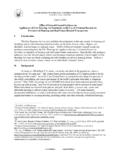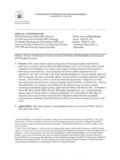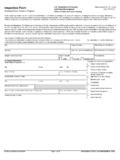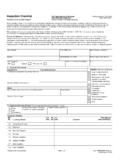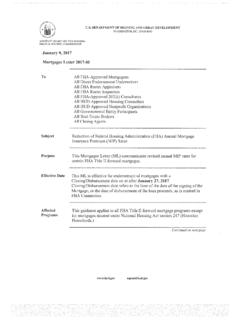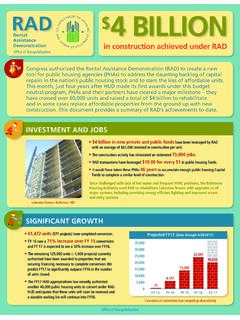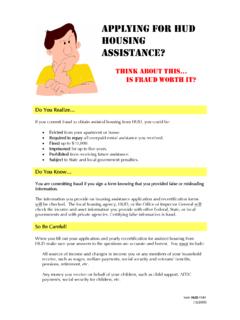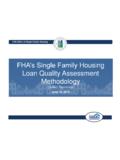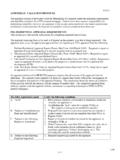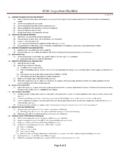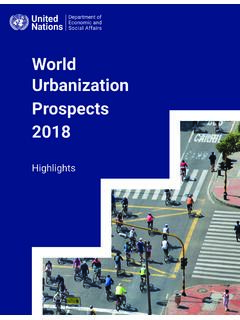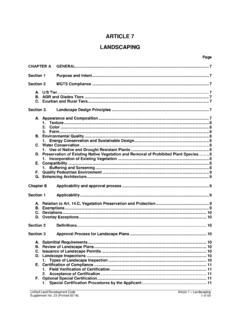Transcription of U.S. DEPARTMENT OF HOUSING AND URBAN …
1 DEPARTMENT OF HOUSING AND URBAN DEVELOPMENT. WASHINGTON, DC 20410-5000. OFFICE OF PUBLIC AND INDIAN HOUSING . Special Attention of: Notice PIH 2022-02. Office Directors or Public HOUSING ; Issued: February 4, 2022. Regional Directors; Public HOUSING Agencies Expires: This notice remains in effect until amended, superseded, or rescinded. Cross References: Notices PIH 2021-14;. PIH 2020-33; PIH 2020-13; PIH 2020-05;. PIH 2011-13, 24 CFR Parts 901, 902, and 907. SUBJECT: Return of Public HOUSING Assessment Systems (PHAS) assessments upon expiration of PHAS-related waivers in Notice PIH 2021-14. 1. Purpose This notice: Advises Public HOUSING Agencies (PHAs) that, consistent with Notice PIH 2021-14. (HA), PHAS scoring will resume starting with the March 31, 2022, Fiscal Year End (FYE) Cohort; and Temporarily adjusts the standard under the Management Assessment Subsystem (MASS) indicator for the Tenant Accounts Receivable (TAR) sub-indicator for the fiscal year 2022 PHAS assessment cycle.
2 2. Background The Coronavirus Aid, Relief, and Economic Security Act (CARES Act Public Law 116-136), signed into law on March 27, 2020, provided HUD with broad authority in the context of the public health emergency to waive certain statutes and regulations (except for requirements related to fair HOUSING , nondiscrimination, labor standards, and the environment) for the Public HOUSING program. The CARES Act waivers provided PHAs with the flexibility to adjust program practices where necessary so that when normal operations were restricted or severely constrained, PHAs could prioritize mission critical functions, sustain occupancy, and mitigate the health risks posed by COVID-19 to PHA staff, residents, and communities. One of the CARES Act waivers HUD implemented suspended PHAS assessments for PHAs with fiscal year end dates beginning March 31, 2020, through December 31, 2021.
3 PHAS is the annual assessment process by which HUD fulfills its statutory requirement1 to assess PHA. administration of the Public HOUSING program. Through PHAS, HUD evaluates indicators as defined by 24 CFR Part 902 that measure the performance of PHAs. These indicators measure a PHA's physical condition, financial condition, management operations, and Capital Fund obligation and occupancy. Ultimately, the culmination of these indicators establishes a PHAS. score, which determines a PHA's designation of High, Standard, Substandard, or Troubled. These designations determine the frequency of PHAS assessments. The CARES Act waivers enabled HUD to delay PHAS assessments and carry over a PHA's last PHAS score. The most recent PIH CARES Act waiver notice (PIH Notice 2021-14(HA)), published on May 4, 2021, extended the period of availability for most CARES Act waivers through December 31, 2021, including the suspension of PHAS scoring.
4 This period will not be extended. Thus, PHAS assessments will begin again, pursuant to statutory requirements, allowing HUD to make a more accurate, up-to-date determination of a PHA's performance. Over the last year, HUD has started incrementally transitioning back to normal requirements associated with PHAS. On April 23, 2021, Secretary Fudge issued a letter to PHA Executive Directors, Multifamily HOUSING Owners, and Property Managers2 stating that HUD would substantially increase HOUSING inspections on June 1, 2021. Upon resuming inspections, HUD. implemented various safety protocols to ensure that onsite inspections were operated in a safe and respectful manner in accordance with Centers for Diseases Control and Prevention (CDC). COVID-19 guidance. HUD resumed physical inspections of Public HOUSING properties on October 5, 2020.
5 As part of these physical inspections, HUD extended the notification period from 14 days to 28 days. In addition, PHAs have resumed inspecting public HOUSING units, and PHAs have continued to submit Financial Data Schedules (FDS) used to calculate the Financial Assessment Sub-system (FASS) Indicator under PHAS. HUD has reviewed the financial data in FASS and determined that, with the implementation of the new MASS standard to account for TAR described in this notice, many PHAs do not need further modifications to PHAS related to the financial and management indicators. Specifically, HUD analyzed FDS data received for 1,182 PHAs with fiscal year end dates in March and June 2021 to evaluate how FASS and MASS indicators of the PHAS score would change if scores were issued using the TAR sub-indicator as described in this notice.
6 HUD found that 91 percent of PHAs would have an improved or unchanged financial score, and 65 percent of PHAs would have an improved or unchanged management score. In April 2020, the occupancy rate using 1. Under Section 6 of the HOUSING Act of 1937 [42 1437 and 76 FR 10136, Public HOUSING Evaluation and Oversight: Changes to the Public HOUSING Assessment System (PHAS). and Determining and Remedying Substantial Default; Interim Rule 2. Secretary Fudge's letter to PHA Executive Directors, Multifamily HOUSING Owners, and Property Managers (dated April 23, 2021). 2. HUD's Agency Priority Goal methodology3 was percent and experienced only a slight decline in December 2021 to percent. Based on this data, HUD has determined that resuming PHAS scoring will not negatively impact many PHAs. 3. Statutory and Regulatory Responsibility to Resume PHAS Scoring and Annual Inspections in FY 2022.]
7 PHAS assessment resumes in 2022 with the March 31, 2022, fiscal year end (FYE) cohort. Fiscal year (FY) 2022 assessments will be used by HUD as a baseline, wherein all qualified properties will be inspected under the Uniform Physical Condition Standards (UPCS). The resulting PHAS. assessment and performance designation of (a) high, (b) standard, (c) substandard, or (d). troubled performer, will establish the subsequent assessment cycle and inspection interval for PHAs. HUD began UPCS inspections on January 1, 2022, for PHAs with fiscal years ending March 31, 2022. All current troubled agencies will be inspected by June 30, 2022, regardless of FYE, and will receive a FY22 PHAS assessment and designation. The remaining non-troubled agencies will be inspected according to their Fiscal Year End (FYE) cohort. 4. The MASS Indicator for the TAR Sub-Indicator for PHAS Scoring in Fiscal Year 2022.
8 The Public HOUSING Evaluation and Oversight: Changes to the Public HOUSING Assessment System (PHAS) and Determining and Remedying Substantial Default ( PHAS Interim Rule ), published on February 23, 2011, at 76 FR 10136, became effective for PHAs with FYE March 31, 2011. Scoring for the MASS indicator is described in the Public HOUSING Assessment System (PHAS): Management Operations Scoring Notice (Management Assessment Subsystem, MASS Scoring Notice ) published on February 23, 2011, at 76 FR 10050. The MASS Scoring Notice explains that PHAs can receive up to five points for TAR, which generally measures the performance of a PHA's ability to collect rents and other charges. The CARES Act included an eviction moratorium through July 31, 2020, and a 30-day notice prior to eviction filings for nonpayment of rent.
9 At the same time, several States and localities issued eviction moratoriums. On September 4, 2020, the Centers for Disease Control (CDC) Director issued an order temporarily halting evictions in the United States due to the ongoing public health crisis. The initial CDC order expired on December 31, 2020, subject to extension, modification, or recission. The Consolidated Appropriations Act, 2021 (Public Law 116-260), extended that order until January 31, 2021, and the original CDC Order was extended multiple times due to the continued national emergency. On August 3, 2021, the CDC Director issued a new order 3. The Agency Priority Goal (APG) for occupancy is a rate based on unit counts. The APG. Occupancy rates applies the Capital Fund occupancy rate. The Capital Fund occupancy rate considers offline units as vacant.
10 The MASS occupancy rate considers offline units as occupied. For example: Capital Fund occupancy counts units as occupied when an assisted tenant, employee or law enforcement personnel, non-assisted and special purpose tenant resides in the unit. The MASS occupancy rate excludes units approved by HUD to be offline for capital improvement, resident services, offices, litigation, and others. 3. temporarily halting evictions for persons in jurisdictions experiencing substantial or high rates of transmission. However, on August 26, 2021, the Supreme Court vacated the stay of a district court decision invalidating the original and new CDC order, holding that the applicants had a substantial likelihood of success on the merits. There have been, and continue to be, effective local and State eviction moratoria related to the ongoing pandemic.
